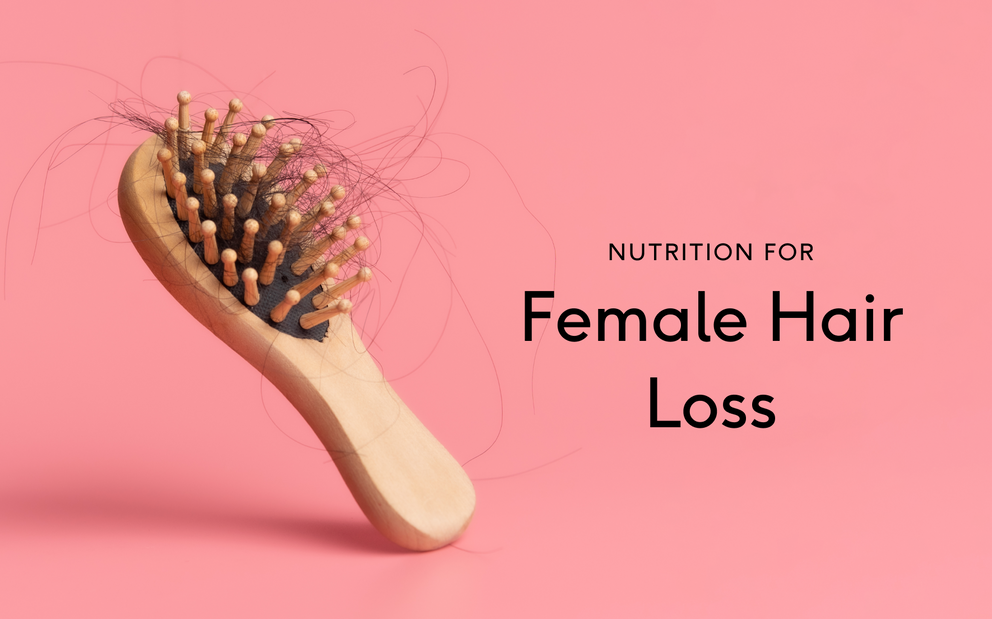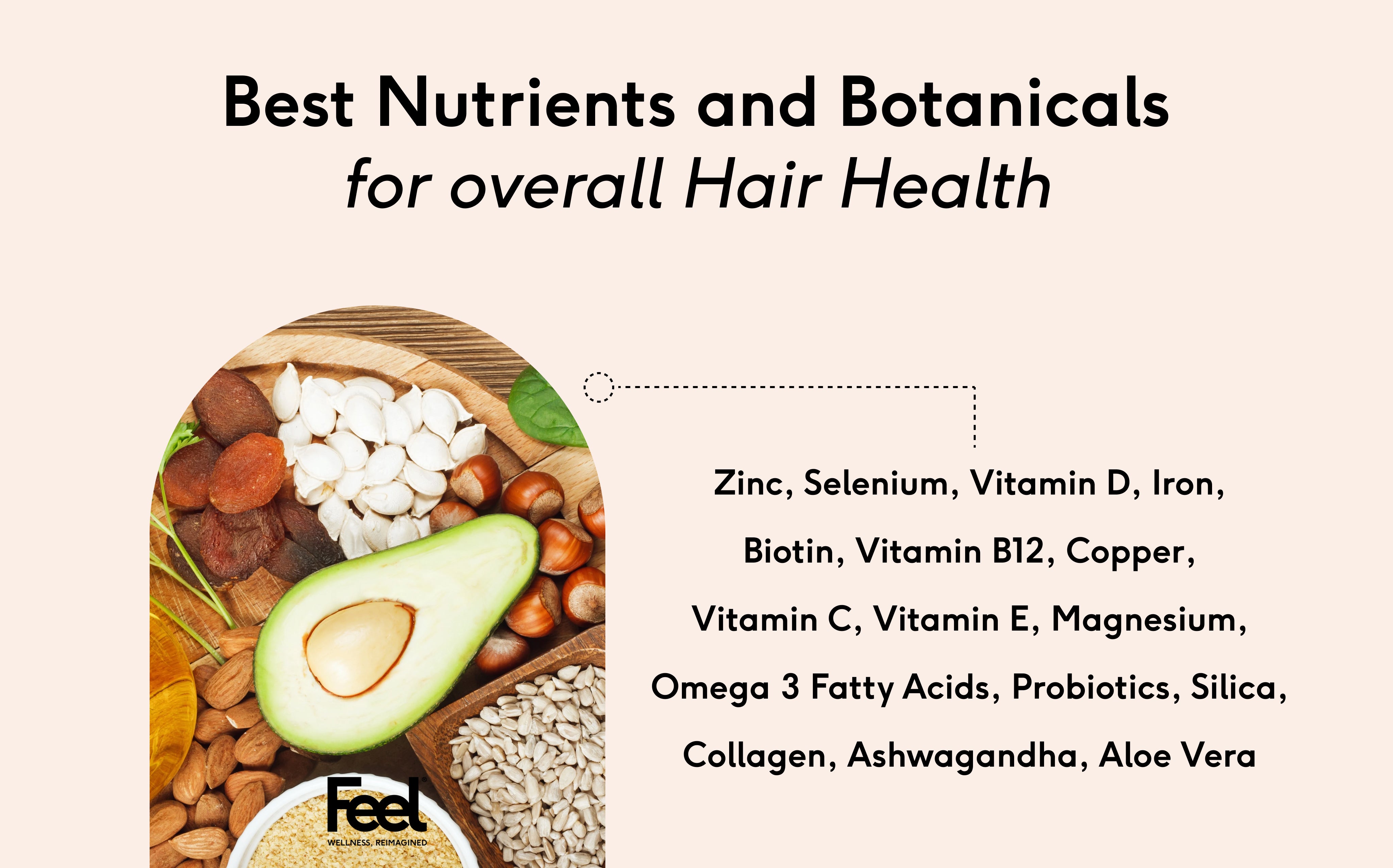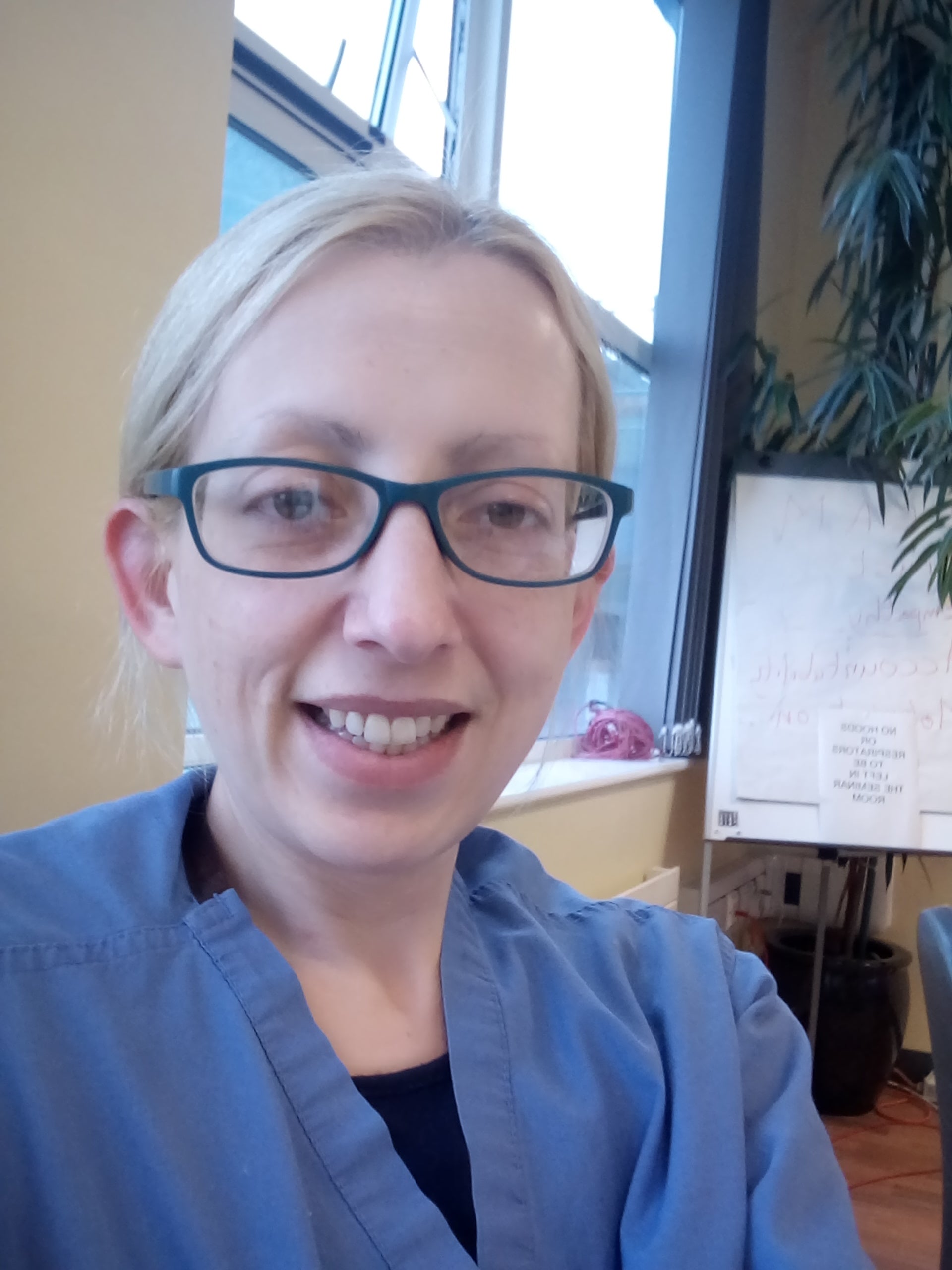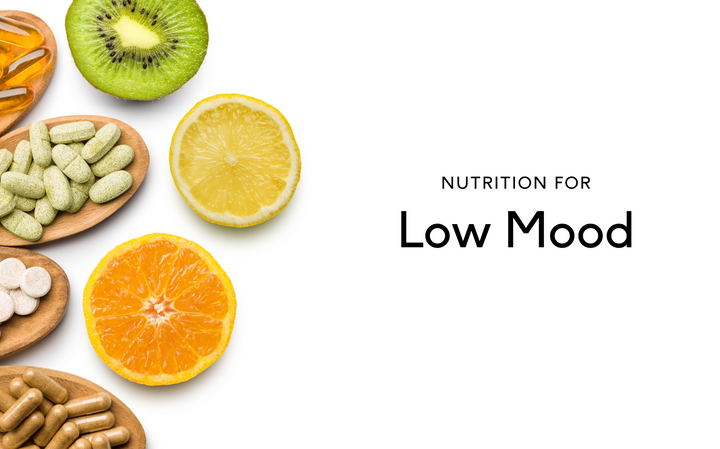Best Vitamins and Minerals for Female Hair Loss [2025 Nutritionist Reviewed]
Karen is a registered Nutritional Therapist with a special interest in women’s health and autoimmunity. Karin now focuses on her work as an independent nutrition consultant, researching and writing nutrition-related content, from social media posts and blogs to peer-reviewed review articles.
Karen is a registered Nutritional Therapist with a special interest in women’s health and autoimmunity. Karin now focuses on her work as an independent nutrition consultant, researching and writing nutrition-related content, from social media posts and blogs to peer-reviewed review articles.
Table of contents

| What causes hair loss | Genetics, illness, stress, childbirth and pregnancy, cancer treatment, harsh chemicals and styling methods, weight loss, malnutrition, gut issues, age, Alopecia or Trichotillomania, hormonal imbalances, scalp conditions, infections. |
| Can the Menopause affect female hair loss | Yes - There is some evidence to suggest that reduced thyroid function, common in menopause coupled with falling levels of oestrogen and progesterone may further influence thinning hair |
| What Vitamins can help with hair loss | Biotin, Vitamin D, Vitamin C, Vitamin E, Folic Acid |
| What Minerals can help with hair loss | Zinc, Iron, Selenium, Magnesium |
| What additional ingredients can help with hair loss | Silica, Collagen, Omega-3, Ashwagandha, Aloe Vera, Probiotics |
| What alternative treatments are there for hair loss | Prescribed oral medication such as Minoxidil or non-prescribed topical Minoxidil. Topical immunotherapy |
1. What is the hair growth cycle?
Hair growth is divided into four distinct phases. The first stage is called anagen which is the growing phase of the hair follicle where the hair seems to continuously be growing 1. The second phase is the catagen phase where hair growth stops and the hair follicle enters the resting phase known as telogen. Hairs do not grow during the telogen phase, nor do they usually fall out, instead new hairs start to form in follicles and then in the final stage known as exogen, hair becomes detached, and the cycle starts again1.
2. What causes hair loss?
Hair is a protein filament that grows from hair follicles in the skin’s epidermis and consists of two parts, the hair follicle, and the hair shaft.

Hair has many functions including protection against the environment, thermoregulation, transmitting sensory information and being a resource for stem cells2. Hair is also very important for our well-being and is a major part of our personality, identity, and appearance. Hair loss can be very distressing, and the cause is not always easily identified2.
It is actually a normal physiological process for healthy hair to shed hair strands on a daily basis and we lose around 50-100 hair strands a day3. However, hair loss and hair shedding can become more severe and noticeable. Possible causes for female hair loss include2, 4:
Genetic hair loss - male and female patterned baldness often runs in families and is usually permanent.
Illness - long periods of chronic illness can disrupt hair growth.
Stress, childbirth, bereavement - as with the above, periods of emotional and physical stress can lead to physiological strain on the body and can result in hair thinning and hair loss.
Cancer treatment - Radiotherapy and chemotherapy can cause hair loss as a side effect of treatment.
Weight loss and malnutrition - poor diet and inadequate nutritional intake can affect hair growth and in particular iron deficiency anaemia and folate deficiency can result in hair loss.
Intestinal issues - Some digestive diseases such as coeliac disease (an autoimmune condition where gluten, a protein found in wheat, barley, and rye causes intestinal damage) has been linked to possible hair loss. Therefore, following a gluten-free diet may help reduce intestinal damage and restore hair.
Hair care - Over-styling, excessive heat, use of chemical hair products, poor hair care, and severe hairstyles that pull on the hair can damage the structure of the hair and lead to weakening and breakage.
Age - Most people notice some hair loss with aging as the hair follicles stop functioning and hair thins, loses its colour and can recede in women.
Alopecia Areata - this is an autoimmune disease where the immune system attacks the hair follicles.
Hormonal imbalance - conditions such as polycystic ovarian disease and thyroid disease can affect hair growth.
Infection- Scalp infections and some sexually transmitted diseases such as Syphilis can cause patchy hair loss on the scalp.
Skin conditions - Skin conditions that are present in the scalp such as psoriasis can affect hair follicles and growth.
Trichotillomania- is a psychological condition where the sufferer has an overwhelming urge to pull out their own hair.
Poisoning- radiation exposure and heavy metal poisoning may also cause hair loss.
3. What nutrients are good for female hair loss?

A healthy balanced diet is a good first step to improving hair health and helping prevent hair loss. However, there is evidence to show that hair loss may be improved with vitamin and mineral supplementation as certain vitamins and minerals are required for normal cell function and growth and contribute to hair follicle structure 5, 6, 7.
Micronutrients play an important role in the hair growth cycle, follicle structure and cell turnover2,4. There are a number of key vitamins that are linked to hair health such as Vitamin A, Vitamin B7 (Biotin), Vitamin C, Vitamin D and Vitamin E4, whereas low serum levels of minerals such as Iron, Selenium, Magnesium, and Zinc have been connected to possible hair thinning and hair loss. For this reason, multivitamin and mineral supplementation has shown promising results with improving overall hair health5.
Dermatology research studies have included several nutrients that are most used in hair supplements to support overall hair health and regrowth:
- B Vitamins – Vitamin B7 (Biotin) is a water-soluble vitamin that helps with the production of Keratin - a protein that makes up your hair, skin, and nails8.
- According to some board-certified Dermatologists, Folic acid helps to promote hair growth, add volume to your hair and even reduce the rate of premature greying by improving the body’s cell production processes9.
- Vitamin C - helps with the natural formation of Collagen in the body, which is a protein that can help strengthen skin at the hair roots.
- Zinc - helps to boost overall immunity and impacts body processes such as hair growth8.
- Vitamin D- low levels of Vitamin D are linked to hair loss5 and interestingly hair restoration specialist clinics often use Vitamin D as part of hair restoration treatments to manage female hair loss.
- Iron - is a mineral that helps the red blood cells deliver oxygen to all cells in the body, including hair follicles7.
- Antioxidants such as Vitamin C and Vitamin E can help protect hair follicles against damage from harmful molecules called free radicals7.
4. What additional ingredients can help improve female hair loss?
- Omega fatty acids – Omega fats have a role in improving blood circulation to the scalp which in turn can help with the transport of nutrients and oxygen, nourishing hair follicles, encouraging hair growth and overall hair health. A study in 120 females found that a 6-month supplementation with Omega 3&6 reduced hair loss while improving hair density and lowering the telogen percentage (hair shredding phase).
- Aloe vera may have health benefits for skin, scalp health, and hair health as it contains polyphenols that have antibacterial and antiviral properties10
- Medications for hair growth recommended by Dermatologists include: Oral Minoxidil (Regaine) is prescription only for men and women in the UK, whilst topical is available without prescription. It targets hereditary hair loss and can help with new regrowth. Minoxidil is most helpful for people with hair loss under 40 years of age10.
(Finasteride or Propecia is a prescription-only oral treatment but it is not suitable for women.)10
- Topical immunotherapy involves treatment for conditions such as alopecia aerata. It uses chemicals that help weaken the autoimmune reaction against the hair follicle in order to reverse the condition.11
- Ashwagandha is an evergreen plant that is used in the alternative treatment of conditions such as stress, fatigue, pain, skin diseases, gastrointestinal issues and hair loss. It helps to promote the delivery of nutrients to the hair follicles by dilating the blood vessels and improving blood circulation.
- Collagen – Collagen is rich in amino acids that your body needs to build keratin, the protein that makes up hair and helps with the strength and structure. Collagen dietary sources include bone broths and meat products. However, for more isolated forms of Collagen, it would be best to consume in supplement form12.
- Silica (Horsetail plant extract) - silica is an important mineral which has been known to deliver essential nutrients to the scalp and hair follicles. There is some scientific evidence to suggest that silica supplementation may help reduce hair thinning and strengthen hair13,14.
5. How do vitamins and minerals improve female hair growth?
Hair growth vitamins and minerals work by an indirect process, improving overall physiological health, which can ultimately impact healthy hair growth8. However, vitamins and minerals do have an important role in normal hair follicle development and deficiency of these nutrients may be associated with temporary hair loss or permanent hair loss. The strongest evidence for this has been seen with Vitamins D and E, and for the mineral Iron11.
6. Do women going through the Menopause experience hair loss?
There has not been much research done on hair loss and menopause. However, there have been many anecdotal reports of women finding that their hair changes during and after menopause15. The average age of menopause is around fifty and, in the months, or years leading up to this, some women notice a change in hair pattern. Commonly, the volume and condition of the hair deteriorates. Some women notice that hair does not grow as much as previously and more hair seems to come out when washing and brushing. Some women, unfortunately, will go on to experience more profound hair loss, with thinning hair at the crown of the head, the sides, or all over the head16. This type of hair loss could most likely be due to reduced thyroid function, common in menopause and coupled with changing hormone levels with oestrogen and progesterone levels falling. These two hormones can keep hair healthy, allowing it to grow faster and less likely to fall out15, 16.
7. How much of vitamins and minerals do I have to take to reduce female hair loss?
It is always best to seek advice from your healthcare provider for specific vitamin and mineral intakes and whether or not you may be deficient, as this will influence the dosage. It is also encouraged to follow a healthy, balanced diet along with improved lifestyle choices.
In general, the recommended amounts for the vitamins and minerals discussed are as follows, according to the NHS guidelines:
Vitamin D- The UK government advise intakes of 10ug, although many people may require higher levels and so the guidance level is 25ug.
Vitamin B12- Intake of this vitamin can be low, especially in certain groups such as those who follow a plant-based diet and ageing adults. Vitamin B12 injections are often administered in very high doses for those who may have low serum levels, however the daily recommended intake is 1.5mcg a day.
Iron- Due to its potential as an oxidant, iron should only be supplemented when levels are low. Low iron levels are best determined by measuring ferritin levels. Daily intakes are suggested as 8.7mg a day for men over 18; 14.8mg a day for women aged 19 to 50 and 8.7mg a day for women over 50. It is advisable not to consume higher than 20mg.
Biotin (Vitamin B7) - 30 mcg/day is recommended as safe17, 18. The guidance level is set at 900 mcg.
8. Can nutrient deficiency cause hair loss?

Research suggest deficiencies in Vitamin B12, Biotin and Iron may be associated with hair loss as these micronutrients are required for normal hair follicle development and immune cell function7,10. Vitamin D deficiency has also been identified as a possible cause of hair loss as it has been noted that those with inadequate Vitamin D can have stunted hair growth19, 20.
9. Where to buy supplements for hair loss?
There are many health and wellness high street stores and online shops that sell hair supplements such as Feel, Amazon, pharmacies and health food stores.
10. How long does it take for nutrients to work for hair loss?

This depends on many factors. For example, which supplement you are taking, any medical conditions you may have, your physical well-being, your diet, and the state of your hair and scalp. Some recommended hair supplements include Vitamins such as A, C, D, and E, as well as Biotin, Zinc, Iron, Magnesium, Selenium, and Omega-3 fatty acids. Other factors such as genetics, medications, and degree of hair damage can all have an effect on the effectiveness of hair supplements. If you are taking a hair supplement for hair growth it is important to remember it will take time before noticeable differences are seen. For any nutritional deficiencies, it can take 3 to 4 months to replenish vitamin and minerals levels and improve symptoms. In one study on hair growth supplements, 38% of participants reported a noticeable change in hair quality after one month.
11. Possible side-effects of taking nutrients for hair loss?
There may be some side effects associated with consuming multivitamins and minerals (including iron) such as constipation, diarrhoea, and an upset stomach. However, these symptoms are usually temporary and may only occur with excessive doses of such nutrients. The side effects will generally go away once the body adjusts to the supplementation. If any of these effects get worse, then it is important to contact your healthcare provider or pharmacist. A common side-effect of Iron is constipation and also causing stools to turn black, but this is not harmful21.
It should be noted that Biotin supplements can cause problems if you consume daily intakes over the guidance level of 900 mcg. Side effects include trouble sleeping, skin rashes, nausea, problems with insulin release, and kidney problems22. Biotin supplementation can also interfere with many diagnostic tests, so it is best to check with doctor if being referred for a blood test.
If you are taking other medications and/or treatments or under the care of a doctor for a medication condition, it is always best to speak to your healthcare provider or pharmacist before taking a supplement. If you are pregnant or breastfeeding it is best to avoid over-the-counter supplements unless advised otherwise by your doctor.
References
-
https://www.sciencedirect.com/topics/medicine-and-dentistry/hair-growth
-
https://www.aad.org/public/diseases/hair-loss/causes/18-causes
-
https://www.webmd.com/connect-to-care/hair-loss/best-vitamins-for-hair-loss-prevention
-
https://www.prevention.com/beauty/hair/g23724399/best-vitamins-hair-growth/
-
Folate (Folic Acid) – Vitamin B9 | The Nutrition Source | Harvard T.H. Chan School of Public Health
-
https://patient.info/news-and-features/can-vitamins-really-prevent-hair-loss
-
https://www.healthline.com/nutrition/collagen-for-hair#TOC_TITLE_HDR_6
-
https://onlinedoctor.lloydspharmacy.com/uk/hair-loss-advice/menopause-hair-loss
-
https://ods.od.nih.gov/factsheets/Biotin-HealthProfessional/
-
Vitamin D Deficiency and Hair Loss: What's the Connection? (healthline.com)
-
https://dpcj.org/index.php/dpc/article/view/dermatol-pract-concept-articleid-dp0701a01
-
Biotin: Benefits, Side Effects, Dosage, and Interactions (verywellhealth.com)























































 Back
Back



